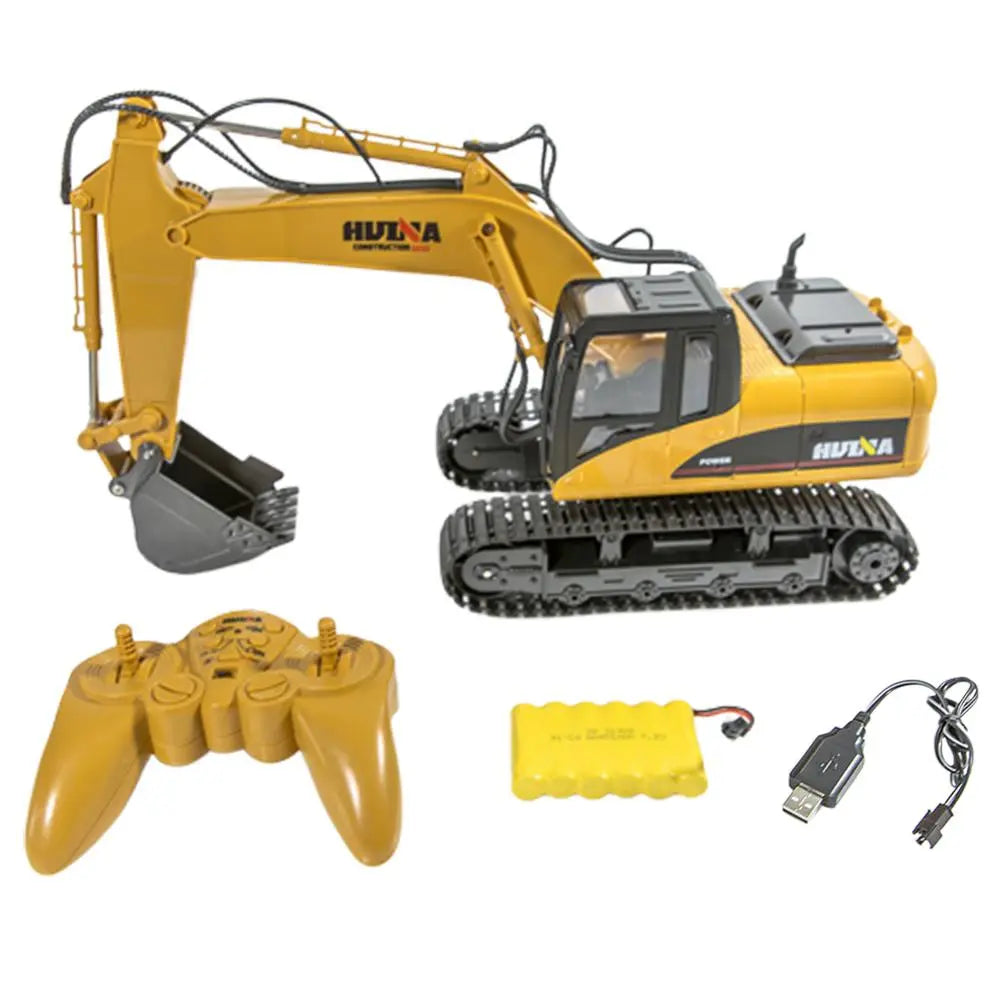Comprehending Just How Excavator Works and Its Impact on Performance
Excavators play an essential duty in building and construction and mining procedures, counting on a complex interaction of mechanical and hydraulic systems. Their capability to do a selection of jobs pivots on both their style and the innovation incorporated within. Recognizing these components can greatly affect functional performance and performance. As innovations continue to improve the industry, one have to think about exactly how these changes will certainly affect future techniques and performance.
The Essentials of Excavator Mechanics

The Duty of Hydraulic Solutions in Excavators
At the heart of excavator operation exists the hydraulic system, which plays a pivotal role in powering the maker's features and motions. This system uses pressurized hydraulic liquid to move power, making it possible for various activities such as swinging, digging, and lifting. By harnessing the concepts of hydraulics, excavators can execute jobs with amazing precision and pressure, enhancing total functional efficiency.The hydraulic system includes crucial elements, including pumps, cyndrical tubes, and valves, which collaborate to control the circulation and instructions of the liquid. When the driver engages the controls, the hydraulic liquid is routed to specific cyndrical tubes, converting the driver's commands right into physical activity. This device permits responsive and smooth activities, which are important in building and excavation environments. double e volvo rc excavator. The efficiency of the hydraulic system directly influences the efficiency and flexibility of the excavator, making it an indispensable element in modern excavation procedures
Key Elements of an Excavator
Comprehending the crucial elements of an excavator is crucial for grasping how this powerful equipment operates. An excavator includes several considerable aspects, consisting of the undercarriage, residence, boom, pail, and arm. The undercarriage provides stability and wheelchair, usually including wheels or tracks to browse various surfaces. Your house consists of the engine and hydraulic systems, permitting the operator to control movement and power the machine. The boom expands from your house, enabling upright reach, while the arm attaches to the bucket, assisting in excavating and lifting operations.Additionally, the taxicab houses the operator, furnished with controls for precise handling. Each of these parts plays an essential role in the excavator's total performance, adding to its performance and effectiveness on building and construction sites. Recognizing these components aids in enhancing and maintaining excavator performance, making certain jobs are completed safely and properly.
Accessory Versatility and Its Advantages
Accessory versatility is an important element of excavators, allowing operators to switch in between various devices customized for particular tasks. This flexibility not only improves task performance yet also adds to cost-effectiveness by minimizing the requirement for numerous machines. Comprehending the various sorts of accessories offered can significantly impact the overall efficiency and performance of an excavator on task sites.
Sorts of Add-ons
While excavators are largely identified for their digging capacities, their real versatility hinges on the broad selection of add-ons offered. These attachments boost the excavator's functionality, allowing it to do numerous tasks past excavation. Typical add-ons consist of pails (for excavating and scooping), hydraulic thumbs (for understanding materials), and augers (for piercing openings) Grapples are utilized for dealing with and moving debris, while rippers can separate difficult surfaces. Other specialized add-ons, such as trenchers and rakes, make it possible for excavators to adjust to specific job needs. This variety not just increases the machine's utility throughout different markets, including building and construction, demolition, and landscaping, but additionally allows operators to customize their devices to fulfill particular task demands effectively.
Increased Job Performance
Taking full advantage of job performance is a main advantage of using various excavator add-ons. Different add-ons enable an excavator to carry out numerous jobs without needing to switch over equipment, saving important time and labor. For example, making use of a hydraulic hammer can damage concrete while a pail attachment can dig deep into dirt, allowing a smooth operations. This adaptability decreases downtime connected with equipment modifications and improves efficiency on-site. Additionally, specialized add-ons enhance accuracy in tasks such as grading or landscaping, leading to higher high quality results. The capability to adjust to different task needs not just simplifies procedures but also reduces the requirement for extra machinery, guaranteeing that jobs are completed promptly and properly. Generally, accessory adaptability significantly adds to enhanced job efficiency in excavation work.
Cost-Effectiveness and Versatility
Cost-effectiveness is a substantial advantage of utilizing functional excavator add-ons. These accessories permit a single excavator to perform numerous tasks, reducing the demand for added machinery and labor - double e volvo rc excavator. By switching in between pails, hammers, and grapples, drivers can deal with different projects, from digging to demolition, therefore making best use of tools utilization. This versatility not just lowers operational expenses yet additionally reduces downtime connected with altering equipment. Additionally, the ability to customize excavators with specialized attachments boosts efficiency, as they can effectively take care of diverse jobs according to job demands. In conclusion, the mix of cost-effectiveness and flexibility in excavator add-ons adds to boosted operational efficiency and source allotment in construction and excavation jobs

Advanced Modern Technology in Modern Excavators
Modern excavators are increasingly outfitted with advanced technology that changes excavation procedures. Automation streamlines procedures, while enhanced gas performance reduces operational costs. In addition, clever control systems improve accuracy and security, noting a significant advancement in excavation tools.
Automation in Excavation Processes
As excavation technology progresses, automation has arised as an important part in boosting efficiency and precision on task sites. Modern excavators are furnished with sophisticated automated systems that help with tasks such as grading, excavating, and trenching with very little operator treatment. These systems make use of sensing units, GPS, and artificial intelligence formulas to guarantee precise placing and depth control, significantly reducing the margin for error. Furthermore, automation permits operators to concentrate on strategic decision-making instead of hands-on controls, resulting in improved productivity on the whole. Such advancements not only simplify workflows but likewise improve security by decreasing human mistake in complex operations. Subsequently, the integration of automation in excavation procedures represents a considerable innovation in building technology, driving the market in the direction visit the site of better efficiency and performance.
Enhanced Gas Effectiveness
Developments in modern technology have likewise led to substantial renovations in fuel efficiency for contemporary excavators. Modern devices are equipped with innovative engines that enhance power result while decreasing fuel usage. These engines use ingenious combustion innovations, such as turbocharging and direct gas injection, to boost performance and effectiveness. In addition, lightweight products in construction minimize general weight, helpful resources permitting much less power expenditure during procedure. The introduction of variable rate controls enables drivers to change engine efficiency according to particular jobs, even more lessening fuel use. Consequently, these improvements not only lower operational costs however also add to ecological sustainability by reducing emissions. Generally, improved gas efficiency in excavators is a necessary advancement that bolsters efficiency and financial viability in the building and construction industry.
Smart Control Equipment
While operators navigate progressively complex work websites, clever control systems in excavators have become necessary devices for boosting performance and precision. These advanced modern technologies use sensors and formulas to keep an eye on different specifications such as lots weight, terrain conditions, and operational performance. By automatically changing hydraulic functions, clever systems enhance equipment performance, causing enhanced performance and reduced wear on components. Furthermore, operators gain from intuitive interfaces that supply real-time comments and diagnostics, allowing for notified decision-making. This integration of modern technology not just improves operations but additionally reduces human mistake, contributing to much safer workplace. As the building and construction industry continues to progress, clever control systems will certainly play an important duty in shaping the future of excavator efficiency and effectiveness.
Enhancing Operational Efficiency With Excavators
Excavators play a vital function in enhancing operational efficiency throughout various construction and excavation jobs. Their flexibility permits for several jobs, consisting of excavating, training, and product handling, which enhances operations and lowers the demand for additional devices. With powerful hydraulic systems, excavators can execute durable tasks with precision, considerably reducing the moment needed to complete projects. The combination of sophisticated technology, such as general practitioner and automated controls, better enhances their procedure, enabling operators to achieve greater accuracy and lower material waste. In addition, contemporary excavators are made to consume less gas and decrease discharges, adding to both cost savings and ecological sustainability. By using excavators effectively, building and construction groups can boost productivity, satisfy job deadlines, and enhance overall website administration. This multifunctionality and performance make excavators vital devices in the contemporary building and construction landscape.
The Future of Excavators in Construction and Mining Industries
As the building and mining sectors advance, the future of excavators is poised for significant improvement driven by technical advancement and transforming functional demands. Breakthroughs in automation and fabricated intelligence are reshaping excavator capacities, permitting enhanced precision and performance in operations. Self-governing excavators are emerging, reducing the demand for human treatment and decreasing the threat of accidents.Moreover, the combination of telematics and IoT innovation enables real-time surveillance of maker performance and anticipating maintenance, enhancing uptime. Green layouts, consisting of hybrid and electric models, are acquiring grip, straightening with sustainability goals within the industry.Additionally, making use of sophisticated products and lighter designs enhances gas effectiveness while keeping performance requirements. As these fads progress, excavators will play an essential role in satisfying the increasing needs for performance and safety in building and construction and mining, inevitably transforming operational landscapes.
Regularly Asked Concerns
How Do Climate Condition Impact Excavator Efficiency?

Weather conditions greatly influence excavator performance, as rainfall and mud can impede grip and stability, while extreme temperatures might affect hydraulic systems. Operators has to adapt to these variables to guarantee optimal performance and safety during procedures.
What Safety And Security Actions Should Operators Comply With While Using Excavators?
Safety procedures for excavator drivers consist of wearing proper personal protective tools, conducting pre-operation examinations, making sure proper communication with ground workers, preserving a safe distance from overhead hazards, and adhering to recognized functional procedures to prevent mishaps.
Exactly How Usually Should Excavators Be Preserved for Optimal Performance?
Excavators must be maintained frequently to guarantee peak performance, commonly every 250 operating hours or as specified by the maker. Regular checks boost dependability, prevent unforeseen breakdowns, and extend the life expectancy of the equipment.
What Is the Average Life Expectancy of an Excavator?
The ordinary lifespan of an excavator generally varies from 10,000 to 15,000 hours of procedure. Factors influencing durability include maintenance techniques, running conditions, and the high quality of the device itself, affecting overall efficiency and performance.

Can Excavators Operate on Irregular Terrain Efficiently?
Excavators can run efficiently on unequal surface due to their verbalized layouts and adjustable tracks. These functions enable them to maintain stability and traction, making it possible for effective operation in challenging atmospheres commonly encountered in construction and landscape design jobs. Each of official site these elements plays an important duty in the excavator's overall capability, adding to its efficiency and efficiency on building websites. Making the most of job efficiency is a main advantage of utilizing numerous excavator attachments. While operators browse significantly complicated task websites, clever control systems in excavators have emerged as necessary devices for enhancing performance and accuracy. Excavators play a crucial role in enhancing operational effectiveness across different building and construction and excavation projects. Advancements in automation and man-made knowledge are improving excavator abilities, enabling for improved accuracy and performance in procedures.